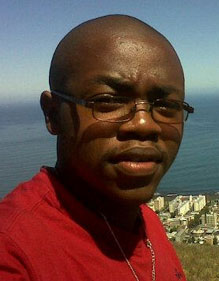
A good education is something nobody can ever take away from you – but what if you never got one in the first place? Lwando Mzandisi of Equal Education comes from Eastern Cape, a province where the quality of the education system has declined, partly because of mismanagement and corruption. Now an education student at the Mowbray campus of the Cape Peninsula Institute of Technology in Cape Town, he's been fighting for better education standards since he was at school.
Mzandisi did his primary schooling in the rural town of Ngcobo in Eastern Cape. But his family moved to Western Cape when he was in grade six, and he finished his schooling at Kwamfundo High in Khayelitsha on the Cape Flats. "I was in Grade 11 when I encountered Equal Education, in 2008," he recalls. "It had just started up, and it was something new for us. I fell in love with the work they were doing, because it was dealing directly with our problems."
This connection is what drew him to work with Equal Education (EE), and it's what has kept him in the movement. "I was experiencing what they were talking about – for instance, we had no permanent physical science teacher at school, and they were drawing attention to the shortage of teachers."
He was also disturbed by the inequality between schools in his area and in more privileged areas such as Rondebosch, which is notable for its high density of schools. "They had public schools just like our school, but we could see that there were big differences. It made us ask questions – if we're part of the same system, why is there such a difference in facilities and resources?"
Today he sits on EE's democratically elected national council as a representative for post-school youth, and advocates for minimum norms and standards for school infrastructure. He's also a trustee of the Bookery, an EE sister organisation that collects books and sets up libraries at underprivileged schools, and he is the co-ordinator of a training programme for committees of representative councils of pupils at high schools.
EE has been dogging basic education minister Angie Motshekga's slow progress in developing norms and standards since 2010. In 2011, the organisation demanded action from Motshekga, or it would proceed with litigation – she responded by saying that she was not obliged to pass the norms, nor did she intend to pass them. In February 2012, the Legal Resources Centre, on behalf of EE and two Eastern Cape schools, filed an application against her in the Bhisho High Court. They won the case through an out-of-court settlement with Motshekga just days before it was due to be heard.
On 29 November 2013, Motshekga, published legally binding norms and standards for school infrastructure, albeit after exceeding the agreed deadline by six months. Now the law requires every school in the country to have water, electricity, internet, working toilets, safe classrooms with a maximum of 40 learners, and security. Once these are in place, each school is required to have libraries, laboratories and sports facilities.
Corruption a factor in the sad state of education
Corruption Watch receives reports daily detailing incidents of corruption in schools, involving a range of irregular activities, from misuse of school money or property to nepotism, pupils asked for favours in return for marks, and the sale of exam and test papers.
"Corruption has certainly played a part in poor school facilities, especially in the Eastern Cape," says Mzandisi, whose own primary school, Sitholeni Junior Secondary School, was a mud school – that is, one that consists of mud structures. Many of these mud schools were built by the parents themselves, and they pose a danger to pupils and teachers because they have no windows or doors, leak on to the occupants when it rains, and generally could collapse at any moment.
"Money gets lost in the system in the province," Mzandisi says, "so you hear of teachers whose contracts are cancelled, or the feeding scheme, or the transport to take pupils to school. In Bhisho office alone millions has gone astray and this contributes to the way education is happening in the Eastern Cape."
Not only that, but teachers sign attendance registers although they are not at school, he says. "Months go by and they get a salary – but they are not in the school. It is happening right now in the province."
In 2012, despairing pupils from Moshesh Senior Secondary in Eastern Cape wrote to EE asking for help at their school. Issues included staff absenteeism, a principal who was not always sober, a shortage of textbooks, and financial mismanagement. "The principal was absent for nine months – no leave is that long," says Mzandisi drily.
EE helped pupils from the school to open a case against Motshekga and the provincial department in November 2012; in August 2013, the parties finally signed a settlement agreement. EE is monitoring the implementation of the remedies detailed in the agreement.
Walking the talk
Another problem is the teachers who are not fully, or even partially, committed to their work, but Mzandisi, in his third year of B.Ed studies, aims to be different. "I will be a teacher one day, and I plan to move back to the rural parts of the Eastern Cape. This is one of my ambitions – I want to be involved in the education system in the province, in the struggle for a decent education."
